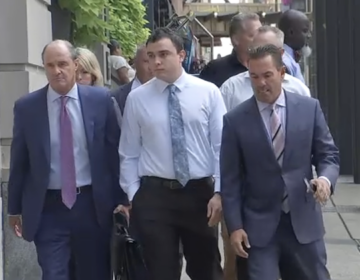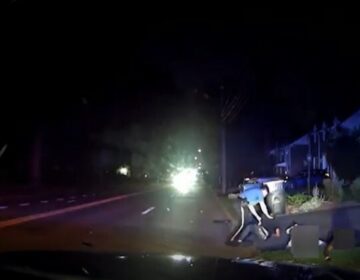‘It’s not just discouraged. It’s now a crime.’ Delaware officially bans the use of chokeholds
Before this year’s national attention on the deadly use of chokeholds by police in the George Floyd case, Delaware law was silent on the practice. It’s now banned.

A Delaware State Police vehicle is seen in a file photo. (Mark Eichmann/WHYY News)
Minneapolis police officer Derek Chauvin’s deadly use of his knee on the neck of George Floyd earlier this year sparked protests against police brutality against Black people.
Though Delaware police departments say officers here were not taught to use chokeholds as a form of self-defense, state law was silent on the practice.
“Police officers here in Delaware have assured us that these techniques are not being used by our officers, but sometimes people in our neighborhoods tell us a different story, and that story has to end,” said state Sen. Tizzie Lockman, who represents much of Wilmington. “We’ve often heard that there’s just a few bad apples in our police agencies when these types of incidents come up, but too often we’ve seen those few bad apples go unpunished. Even when their actions have resulted in the death of the very citizens they’re sworn to protect.”
In late June, Carney issued an executive order banning the use of chokeholds by statewide police officers including the Delaware State Police, Capitol Police, and officers in the Department of Correction. Thursday, he signed HB 350, which expands that ban, making it a felony for an officer to use a chokehold. “We have heard the voices calling for change and we are focused on taking meaningful action in Delaware,” Carney said.
“HB 350 goes a step further by extending that ban to all law enforcement agencies throughout Delaware and creates a grounds through which those who still might use this unsanctioned technique might be held accountable,” Lockman said. “So it’s not just discouraged. It’s now a crime.”
“We watched in horror the gruesome murder of Mr. George Floyd in Minneapolis, Minnesota,” said state Rep. Nnamdi Chukwuocha, the bill’s main sponsor. “We surely believe that house bill 350 helps to ensure, as much as we can, that that type of behavior would not happen here.”
There is one exception built into the law. The use of a chokehold is permitted if the officer “reasonably believes deadly force is necessary to protect the life of a civilian or an officer.” That’s a similar standard that permits officers to use deadly force. Some, including Delaware Attorney Kathy Jennings, have questioned whether that standard is too lax. In June, Jennings said that changing the law is high on her list of police reforms needed immediately.
Lockman and Chukwuocha are both members of the Delaware Legislative Black Caucus, which is advocating for more reforms through its Justice for All agenda. Beyond banning chokeholds, the group of lawmakers also want to require police body cams throughout the state and change the Police Bill of Rights to give defendants and their lawyers access to police disciplinary records.
“It’s not just about the violent crime that an individual in our society my visit upon one another. It’s also about who gets held accountable for doing that harm, and who might be excused from accountability,” Lockman said.
State lawmakers have also formed the Police Accountability Task Force made up of elected officials, members of law enforcement and community activists. The group is led by state Rep. Franklin Cooke who is also a member of the Legislative Black Caucus. The task force is designed to address issues of racial injustice and police brutality. The group will report its findings to the General Assembly.
WHYY is your source for fact-based, in-depth journalism and information. As a nonprofit organization, we rely on financial support from readers like you. Please give today.






